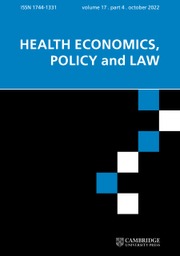Crossref Citations
This article has been cited by the following publications. This list is generated based on data provided by
Crossref.
Kawachi, Ichiro
2006.
Commentary: Social capital and health: making the connections one step at a time.
International Journal of Epidemiology,
Vol. 35,
Issue. 4,
p.
989.
Islam, M. Kamrul
Gerdtham, Ulf-G.
Gullberg, Bo
Lindström, Martin
and
Merlo, Juan
2008.
Social capital externalities and mortality in Sweden.
Economics & Human Biology,
Vol. 6,
Issue. 1,
p.
19.
Kawachi, Ichiro
Subramanian, S.V.
and
Kim, Daniel
2008.
Social Capital and Health.
p.
1.
Kim, Daniel
Subramanian, S.V.
and
Kawachi, Ichiro
2008.
Social Capital and Health.
p.
139.
Kravdal, Øystein
2008.
Does income inequality really influence individual mortality?.
Demographic Research,
Vol. 18,
Issue. ,
p.
205.
IVERSEN, TOR
2008.
An exploratory study of associations between social capital and self-assessed health in Norway.
Health Economics, Policy and Law,
Vol. 3,
Issue. 4,
p.
349.
Stoyanova, Alexandrina
and
Díaz-Serrano, Luis
2009.
El impacto diferencial del capital social sobre la salud mental de la población autóctona y los inmigrantes residentes en Cataluña.
Gaceta Sanitaria,
Vol. 23,
Issue. ,
p.
93.
Franzini, Luisa
and
Giannoni, Margherita
2010.
Determinants of health disparities between Italian regions.
BMC Public Health,
Vol. 10,
Issue. 1,
Kawachi, Ichiro
2010.
Health Assets in a Global Context.
p.
167.
Borgonovi, Francesca
2010.
A life-cycle approach to the analysis of the relationship between social capital and health in Britain.
Social Science & Medicine,
Vol. 71,
Issue. 11,
p.
1927.
Cheung, Chau-kiu
and
Leung, Kwok
2010.
Ways that Social Change Predicts Personal Quality of Life.
Social Indicators Research,
Vol. 96,
Issue. 3,
p.
459.
d'Hombres, B.
Rocco, L.
Suhrcke, M.
and
McKee, M.
2010.
Does social capital determine health? Evidence from eight transition countries.
Health Economics,
Vol. 19,
Issue. 1,
p.
56.
Ljungvall, Åsa
and
Gerdtham, Ulf-G.
2010.
More equal but heavier: A longitudinal analysis of income-related obesity inequalities in an adult Swedish cohort.
Social Science & Medicine,
Vol. 70,
Issue. 2,
p.
221.
Aakvik, Arild
Holmås, Tor Helge
and
Kamrul Islam, M.
2010.
Does variation in general practitioner (GP) practice matter for the length of sick leave? A multilevel analysis based on Norwegian GP-patient data.
Social Science & Medicine,
Vol. 70,
Issue. 10,
p.
1590.
Özcan, Burcu
and
Bjørnskov, Christian
2011.
Social trust and human development.
The Journal of Socio-Economics,
Vol. 40,
Issue. 6,
p.
753.
Yamamura, Eiji
2011.
Different effects of social capital on health status among residents: Evidence from modern Japan.
The Journal of Socio-Economics,
Vol. 40,
Issue. 5,
p.
475.
Yamamura, Eiji
2011.
Differences in the effect of social capital on health status between workers and non-workers.
International Review of Economics,
Vol. 58,
Issue. 4,
p.
385.
Tampubolon, Gindo
2012.
Neighbourhood Effects Research: New Perspectives.
p.
175.
Griep, Rosane Harter
Santos, Simone M
Cardoso, Leticia de Oliveira
Fonseca, Maria de Jesus Mendes da
Alves, Marcia Guimaraes de Mello
Souto, Ester Paiva
and
Chor, Dora
2013.
Capital social no ELSA-Brasil: confiabilidade teste-reteste do Resource Generator scale.
Revista de Saúde Pública,
Vol. 47,
Issue. suppl 2,
p.
131.
Kourtit, Karima
and
Nijkamp, Peter
2013.
IN SEARCH OF CREATIVE CHAMPIONS IN HIGH‐TECH SPACES: A SPATIAL APPLICATION OF STRATEGIC PERFORMANCE MANAGEMENT.
Journal of Regional Science,
Vol. 53,
Issue. 5,
p.
749.


